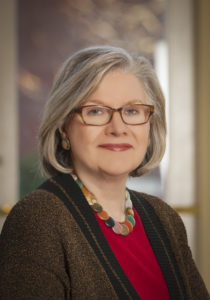Emily Zimmern served as Executive Director and President of Levine Museum of the New South from 1995 to 2015. Under her leadership, active engagement in Charlotte’s civic life became the museum’s hallmark and the institution attracted national attention as a place of dialogue, an advocate for inclusion, and an incubator of community. The museum received numerous accolades, including two Excellence in Exhibition Awards from the American Alliance of Museums. At the White House in 2006, First Lady Laura Bush presented Levine Museum with the esteemed National Award for Museum Service. The museum’s widely acclaimed COURAGE exhibit about the landmark Brown school desegregation case toured nationally and a smaller version traveled in South Africa.
More recently, Levine Museum has addressed topics of immigration and cultural diversity. The exhibition Changing Places from Black and White to Technicolor was on display in 2009 and 2010. It explored the demographic and cultural change in Charlotte, North Carolina, brought about by the arrival of newcomers from across the country and around the globe. Through Speaking of Change dialogues, more than 1,600 adults in 118 groups explored the challenges of blending old and new cultures in a rapidly diversifying city. A similar dialogue program for teens entitled Turn the Tables attracted more than 1,200 participants in 52 groups.
Thanks to an Innovation Lab grant from the American Alliance of Museums’ Center for the Future of Museums, Levine Museum, in partnership with the Atlanta History Center and the Birmingham Civil Rights Institute, launched in 2012 the Latino New South Learning Network. It sought to document the growth and influence of Latinos in the southeastern U.S. The findings of the collaborative initiative shaped the development of the 3,500 square foot bilingual exhibition NUEVOlution: Latinos and the New South, which opened in Charlotte in October 2015. It will travel to Birmingham in 2017 and to Atlanta in 2018. Complementary programming and dialogues have offered multiple opportunities for broader community engagement and deeper exploration of related issues during the 14-month run in Charlotte.
The University of North Carolina at Charlotte has been an invaluable partner in both the Changing Places and Latino New South projects. The University presented a twelve-month series of panel discussions entitled Changing Times, Changing Minds in 2009-2010. UNC Charlotte professors Dr. Heather Smith and Dr. Susan Harden led the evaluation of dialogues for both exhibition projects. Dr. Heather Smith served on the innovation team for the Latino New South project.
Through her work at Levine Museum, Emily Zimmern has become involved in immigration issues in the Charlotte community. She was invited to co-chair the City of Charlotte’s Immigrant Integration Task Force, which presented its comprehensive recommendations to City Council in March 2015. Based on her experiences both at the museum and with the task force, she has been invited to make a number of presentations, including talks at Welcoming American conferences, the American Alliance of Museums annual meeting and the Yeongwol International Museum Forum in South Korea. She was a co-author of an article published in the journal Museums and Social Issues: “Speaking of Change in Charlotte, North Carolina: How Museums Can Shape Immigrant Receptivity in a Community Navigating Rapid Cultural Change.” She was lead author of a chapter, “A Decade of Community Engagement through the Lens of Empathy”, in the book Fostering Empathy through Museums, edited by Elif M. Gokcigdem.
From her twenty years of experience leading Levine Museum of the New South, she has come to believe ever more strongly that shared stories build community, that everyone’s history matters, and that confronting the unvarnished truth about the past can set individuals and communities free to change and create a better future.
A native of Louisiana, Emily received her BA and MA in American history from Vanderbilt University and MBA from Queens College. She is also a graduate of Leadership Charlotte, the American Leadership Forum, Charlotte Chapter, and the Innovation Institute of the McColl Center for Art + Innovation. In 2001, she completed the Harvard Business School’s executive education course “Strategic Perspectives in Nonprofit Management.” In 2016 she was awarded an honorary Doctor of Public Service degree from the University of North Carolina at Charlotte.
Long active in community affairs and the nonprofit sector, she has held leadership positions on the boards of the Community Building Initiative, Planned Parenthood, Crisis Assistance Ministry, Foundation for the Carolinas, Charlotte Jewish Federation, and United Jewish Appeal. In 2007 she traveled with other civic and government leaders from Charlotte on a Center for International Understanding study tour to Mexico to learn about migration issues. Most recently she served as board chair of the North Carolina Center for Nonprofits and a member of the Charlotte-Mecklenburg Schools’ Cultural Competency Task Force. Honors include Charlotte Woman of the Year 2002, the Thurgood Marshall College Fund Award of Excellence 2011 and Leadership Charlotte’s Schley R. Lyons Circle of Excellence Award 2013.





